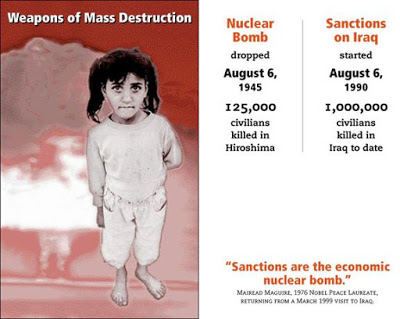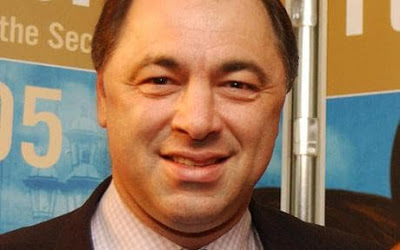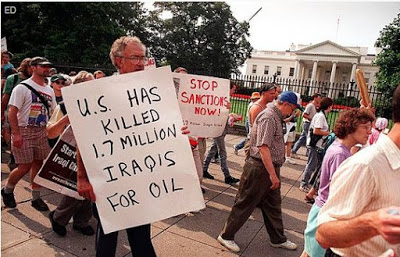Ivor Caplin – War Criminal and
Junior Defence Minister under Tony Blair
Personally Fingered Riad
On March 8th, Riad El-Taher received a letter out of the blue (as one does!) from
a Sam Matthews at Labour Party Headquarters.
It notified Riad that he had been auto-expelled (i.e. with no rights of appeal or representation) because in 2010 he had been
imprisoned for ten months for trying to relieve the effects of sanctions on
Iraq by paying a bribe for importing oil for food.
 |
| A reminder of the deadly nature of the Iraq sanctions that war criminals like Ivor Caplin supported |
To
understand the context of Riad’s actions, for which he paid a very heavy
penalty, for what was a humanitarian endeavour, one needs to recollect the
words of the US Secretary of State Madeleine Albright. John Pilger described, in the Guardian on 4th
March 2000, how when he was in Washington
understand the context of Riad’s actions, for which he paid a very heavy
penalty, for what was a humanitarian endeavour, one needs to recollect the
words of the US Secretary of State Madeleine Albright. John Pilger described, in the Guardian on 4th
March 2000, how when he was in Washington
‘I interviewed James Rubin, an under secretary
of state who speaks for Madeleine Albright. When asked on US television if she
thought that the death of half a million Iraqi children was a price worth
paying, Albright replied: “This is a
very hard choice, but we think the price is worth it.”
of state who speaks for Madeleine Albright. When asked on US television if she
thought that the death of half a million Iraqi children was a price worth
paying, Albright replied: “This is a
very hard choice, but we think the price is worth it.”
 |
| Riad |
When I questioned
Rubin about this, he claimed Albright’s words were taken out of context. He
then questioned the “methodology”
of a report by the UN’s World Health Organisation, which had estimated half a
million deaths. Advising me against being “too idealistic“, he said: “In making policy, one has to choose between two bad choices . . . and
unfortunately the effect of sanctions has been more than we would have
hoped.” He referred me to the “real world” where “real
choices have to be made”. In mitigation, he said, “Our sense is that prior to sanctions, there
was serious poverty and health problems in Iraq.” The opposite was
true, as Unicef’s data on Iraq before 1990, makes clear.’
Rubin about this, he claimed Albright’s words were taken out of context. He
then questioned the “methodology”
of a report by the UN’s World Health Organisation, which had estimated half a
million deaths. Advising me against being “too idealistic“, he said: “In making policy, one has to choose between two bad choices . . . and
unfortunately the effect of sanctions has been more than we would have
hoped.” He referred me to the “real world” where “real
choices have to be made”. In mitigation, he said, “Our sense is that prior to sanctions, there
was serious poverty and health problems in Iraq.” The opposite was
true, as Unicef’s data on Iraq before 1990, makes clear.’
 |
| Ivor Caplin, War Criminal and former MP for Hove and a dedicated Zionist member of the Jewish Labour Movement. Caplin was a junior Defence Minister at the time of the Iraq War |
This is the
background to Riad’s outrageous expulsion by dictat. An expulsion by an unelected official, a
nobody who has never lifted a finger in his life to campaign against war,
famine or injustice.
background to Riad’s outrageous expulsion by dictat. An expulsion by an unelected official, a
nobody who has never lifted a finger in his life to campaign against war,
famine or injustice.
The real reason
for Riad’s expulsion lies in what took place less than two weeks previously. Despite all
the manipulation and gerry mandering over the past 9 months, all
the failed attempts at vote-fixing by Labour’s officials and NEC members like Ann Black, attempts which led to the suspension of the Brighton
and Hove District Labour Party on July 2nd last year [Brighton &
Hove Labour Party Suspended by National Labour Party, The Lies of
Warren Morgan & Kyle Rebound on Them] Hove Labour
Party voted in a complete slate of Momentum officers and Executive members, which
included Riad. This was very bad news
for the local Progress MP Peter Kyle, who had been hoping that his supporters
would take control.
for Riad’s expulsion lies in what took place less than two weeks previously. Despite all
the manipulation and gerry mandering over the past 9 months, all
the failed attempts at vote-fixing by Labour’s officials and NEC members like Ann Black, attempts which led to the suspension of the Brighton
and Hove District Labour Party on July 2nd last year [Brighton &
Hove Labour Party Suspended by National Labour Party, The Lies of
Warren Morgan & Kyle Rebound on Them] Hove Labour
Party voted in a complete slate of Momentum officers and Executive members, which
included Riad. This was very bad news
for the local Progress MP Peter Kyle, who had been hoping that his supporters
would take control.
 |
| Riad’s expulsion is about protecting this man – Peter Kyle Progress MP for Hove |
This was the cue
for Ivor Caplin, a close personal friend of Kyle and the previous MP as well as
Junior Defence Minister under Blair at the time of the Iraq War, to finger Riad
for his humanitarian efforts during the sustained US and UK bombing of Iraq and
the sanctions levied against that country which preceded the war itself. People often forget these sanctions but
they led to the death of an estimated
half a million children. Sanctions,
which are ‘anti-Semitic’ if imposed on Israel, were perfectly fine when imposed on
Iraq. The sanctions caused a modern
state with an up to the date health system to turn into a third world
relic. This is what is commonly known as
imperialism and the Ivor Caplins of this world are its bloody practitioners.
for Ivor Caplin, a close personal friend of Kyle and the previous MP as well as
Junior Defence Minister under Blair at the time of the Iraq War, to finger Riad
for his humanitarian efforts during the sustained US and UK bombing of Iraq and
the sanctions levied against that country which preceded the war itself. People often forget these sanctions but
they led to the death of an estimated
half a million children. Sanctions,
which are ‘anti-Semitic’ if imposed on Israel, were perfectly fine when imposed on
Iraq. The sanctions caused a modern
state with an up to the date health system to turn into a third world
relic. This is what is commonly known as
imperialism and the Ivor Caplins of this world are its bloody practitioners.
Riad was caught
up in the UN’s oil for food programme and as part of getting food into Iraq he
was involved in paying a financial surcharge to the Iraqi regime. Since he was one of many doing the same thing
and given that there was no personal financial motive, his prosecution and
gaoling can be seen as a calculated and vindictive measure by the Blair
government which engaged in illegal extra-ordinary rendition and collusion in torture.
up in the UN’s oil for food programme and as part of getting food into Iraq he
was involved in paying a financial surcharge to the Iraqi regime. Since he was one of many doing the same thing
and given that there was no personal financial motive, his prosecution and
gaoling can be seen as a calculated and vindictive measure by the Blair
government which engaged in illegal extra-ordinary rendition and collusion in torture.
The real
criminals in this are not Riad, but the Ivor Caplins and Tony Blairs who should
be prosecuted for the deaths during the sanctions regime and the war
itself.
criminals in this are not Riad, but the Ivor Caplins and Tony Blairs who should
be prosecuted for the deaths during the sanctions regime and the war
itself.
Jeremy Corbyn
came to power because, at least in part, due to his record in opposing the attacks
on Iraq. It is shameful that as Leader he has not so much as lifted his lifted his little finger to countermand
the expulsion by Sam Matthews and the other apparatchiks at Labour Party HQ.
came to power because, at least in part, due to his record in opposing the attacks
on Iraq. It is shameful that as Leader he has not so much as lifted his lifted his little finger to countermand
the expulsion by Sam Matthews and the other apparatchiks at Labour Party HQ.
Tony Greenstein
From: Sam Matthews <[email protected]>
To: Riad El-taher <[email protected]>
Sent: Tuesday, 14 March 2017, 15:51
Subject: RE: your letter 9.03.2017
To: Riad El-taher <[email protected]>
Sent: Tuesday, 14 March 2017, 15:51
Subject: RE: your letter 9.03.2017
Dear Mr El-Taher,
Thank you for your letter.
As outlined in our letter to you
on the 9th March , being convicted of four accounts of Making
funds available to Iraq except under the authority of a licence granted by the
Treasury is a serious crime, for which you served a custodial sentence.
on the 9th March , being convicted of four accounts of Making
funds available to Iraq except under the authority of a licence granted by the
Treasury is a serious crime, for which you served a custodial sentence.
You remain ineligible for
membership of the Labour Party. There is no right to appeal an auto-exclusion.
membership of the Labour Party. There is no right to appeal an auto-exclusion.
The Labour Party considers this
matter closed and will not consider an application to re-join until the 9th
March 2022. We will not be responding further on this matter.
matter closed and will not consider an application to re-join until the 9th
March 2022. We will not be responding further on this matter.
Regards
Sam Matthews
Head of Disputes
Governance and Legal Unit
The Labour Party
Southside,
105 Victoria Street, London, SW1E 6QT
105 Victoria Street, London, SW1E 6QT
11th
March 2017
March 2017
Mr S Matthews
Head of Disputes
The Labour Party
Southside
105 Victoria Street
London SWIE 6QE
Your Ref: A644374
Dear Mr Matthews,
Thank you for your letter of 9th
March informing me that I have been expelled from the Labour Party.
March informing me that I have been expelled from the Labour Party.
I note that sub-section iii of Chapter
2.1.4.D in the Labour Party rules, which you quote, is the third and most
severe of three options under that Clause 1.4.D. which reads: ‘where a member
has been convicted of a serious criminal offence the NEC shall have the right
to impose the appropriate disciplinary action from the following options.’ The
other options are suspension and referral of a disciplinary case to the NCC.
2.1.4.D in the Labour Party rules, which you quote, is the third and most
severe of three options under that Clause 1.4.D. which reads: ‘where a member
has been convicted of a serious criminal offence the NEC shall have the right
to impose the appropriate disciplinary action from the following options.’ The
other options are suspension and referral of a disciplinary case to the NCC.
The phrase ‘serious criminal offence’
might suggest murder, war crimes or bank robbery, not paying an Iraqi surcharge
on oil-for-food transactions that were designed to relieve the desperate plight
of the Iraqi people. Madeline Albright may have considered the death of half a
million Iraqi children a price worth paying in order to achieve regime change
but I took a different view and acted accordingly. Is that a serious criminal
offence?
might suggest murder, war crimes or bank robbery, not paying an Iraqi surcharge
on oil-for-food transactions that were designed to relieve the desperate plight
of the Iraqi people. Madeline Albright may have considered the death of half a
million Iraqi children a price worth paying in order to achieve regime change
but I took a different view and acted accordingly. Is that a serious criminal
offence?
There is now widespread agreement, both within and
beyond the Labour Party, that the policies pursued by the Blair and Bush
administrations were profoundly mistaken and that they caused incalculable
suffering to the Iraqi people and resulted in the subsequent disastrous destabilisation
of the country. In view of this, would it not have been
more appropriate to refer my case to the NEC to consider the whole matter in
more depth? Were those who made the decision to expel me fully conversant with
the political situation seventeen years ago and are they now, in retrospect,
untroubled by the actions of the British and American governments of that time?
beyond the Labour Party, that the policies pursued by the Blair and Bush
administrations were profoundly mistaken and that they caused incalculable
suffering to the Iraqi people and resulted in the subsequent disastrous destabilisation
of the country. In view of this, would it not have been
more appropriate to refer my case to the NEC to consider the whole matter in
more depth? Were those who made the decision to expel me fully conversant with
the political situation seventeen years ago and are they now, in retrospect,
untroubled by the actions of the British and American governments of that time?
The fact that you chose the most severe option
in disciplining me and decided against investigating the matter further,
suggests that pressure was brought to bear from some undisclosed quarter and
that there is no likelihood the NEC would consider there were ‘exceptional
circumstances’ justifying the relaxation of the ‘five year’ exclusion.
in disciplining me and decided against investigating the matter further,
suggests that pressure was brought to bear from some undisclosed quarter and
that there is no likelihood the NEC would consider there were ‘exceptional
circumstances’ justifying the relaxation of the ‘five year’ exclusion.
I left the Labour Party as a result
of the war in Iraq, my country of birth, and re-joined following Jeremy
Corbyn’s election as leader believing it to be a compassionate organisation,
concerned with the welfare not only of the British people but of others across
the globe. My membership of the Labour Party is, compared with these greater realities;
of minor consequence but it is a cause for concern that you, as a
representative of a party with equality and justice at its heart should act in
this way. If the purpose of removing me from the Labour Party is to purge its
membership of disreputable members I could suggest rather more suitable
candidates for removal.
of the war in Iraq, my country of birth, and re-joined following Jeremy
Corbyn’s election as leader believing it to be a compassionate organisation,
concerned with the welfare not only of the British people but of others across
the globe. My membership of the Labour Party is, compared with these greater realities;
of minor consequence but it is a cause for concern that you, as a
representative of a party with equality and justice at its heart should act in
this way. If the purpose of removing me from the Labour Party is to purge its
membership of disreputable members I could suggest rather more suitable
candidates for removal.
I am attaching to this letter a
brief account of the events surrounding my payment of the surcharge. The
recently deceased Tam Dalyell, Labour MP and Father of the House of Commons,
was fully aware of the situation in which I found myself at that time and
commented on my subsequent conviction and imprisonment as follows: ‘That
Riad El Taher should land up in Wandsworth gaol was, in my opinion, a process
of nasty, political vengeance.’
brief account of the events surrounding my payment of the surcharge. The
recently deceased Tam Dalyell, Labour MP and Father of the House of Commons,
was fully aware of the situation in which I found myself at that time and
commented on my subsequent conviction and imprisonment as follows: ‘That
Riad El Taher should land up in Wandsworth gaol was, in my opinion, a process
of nasty, political vengeance.’
Yours sincerely,
Riad El-Taher.
cc Governance and Legal Unit
The
circumstances surrounding Riad El-Taher’s payment of the surcharge
circumstances surrounding Riad El-Taher’s payment of the surcharge
Following a visit to Iraq in 1993, Tam Dalyell, whom
I had invited to accompany me, suggested I set up an organisation,
Friendship Across Frontiers (FAF), to campaign against the sanctions regime. FAF
had Tam Dalyell as Patron and following his retirement, Harry Cohen and was
supported by many Members of Parliament.
I had invited to accompany me, suggested I set up an organisation,
Friendship Across Frontiers (FAF), to campaign against the sanctions regime. FAF
had Tam Dalyell as Patron and following his retirement, Harry Cohen and was
supported by many Members of Parliament.
In 1996, following widespread concern at the level
of human suffering caused by the sanctions the UN introduced the oil-for-food
programme that had been agreed in principle in 1991. The programme required oil
to be sold within a six month period and to ensure that this was achieved I was
approached by the Iraqi government, due to my experience and expertise in the
oil industry, to ensure the oil was sold in a timely manner; every oil allocation
in my name was approved by the Department for Trade and Industry (DTI), Foreign
Office (FO) and the UK Mission at the UN.
of human suffering caused by the sanctions the UN introduced the oil-for-food
programme that had been agreed in principle in 1991. The programme required oil
to be sold within a six month period and to ensure that this was achieved I was
approached by the Iraqi government, due to my experience and expertise in the
oil industry, to ensure the oil was sold in a timely manner; every oil allocation
in my name was approved by the Department for Trade and Industry (DTI), Foreign
Office (FO) and the UK Mission at the UN.
The fund was paid into a UN escrow account and its
use depended on the agreement of the 661 Committee that oversaw the oil-for-food
programme. This system failed to deliver the benefits intended due to an
extremely restricted interpretation of what Iraq could use the funds for and
even for goods that were agreed, there was a time-lapse from order to delivery of
around six months. The fact that the Iraqi government was unable to directly purchase
locally produced food and medicines or use any of the money it had earned from
the sale of oil meant it was unable to satisfy the urgent needs of its people in
the easiest, speediest and cheapest way possible.
use depended on the agreement of the 661 Committee that oversaw the oil-for-food
programme. This system failed to deliver the benefits intended due to an
extremely restricted interpretation of what Iraq could use the funds for and
even for goods that were agreed, there was a time-lapse from order to delivery of
around six months. The fact that the Iraqi government was unable to directly purchase
locally produced food and medicines or use any of the money it had earned from
the sale of oil meant it was unable to satisfy the urgent needs of its people in
the easiest, speediest and cheapest way possible.
The US Secretary of State, Madeleine Albright, interviewed
about the effect of sanctions indicated that the death of half million children
was a price worth paying. Worldwide public opinion was outraged and it became
clear that action should be taken immediately to avert the disaster that was
unfolding. A recommendation was eventually made to the 661 Committee that a
cash component of $600 million per six-month phase should be paid directly to
the Iraqi government. However, in 1999 this proposal, which was supported by
the thirteen other members of the 661 Committee, was vetoed by the US and UK
representatives.
about the effect of sanctions indicated that the death of half million children
was a price worth paying. Worldwide public opinion was outraged and it became
clear that action should be taken immediately to avert the disaster that was
unfolding. A recommendation was eventually made to the 661 Committee that a
cash component of $600 million per six-month phase should be paid directly to
the Iraqi government. However, in 1999 this proposal, which was supported by
the thirteen other members of the 661 Committee, was vetoed by the US and UK
representatives.
At this stage the Iraqi government decided to compensate for the lack of money
it was expecting the 661 Committee to approve by introducing a surcharge on all
oil-for-food transactions. The US and UK governments were fully aware that all
approved oil lifters had to pay the surcharge and yet they took no action
against them and issued no warnings. I concluded that these governments were
deliberately turning a blind eye to these payments. Moreover, I was in sympathy
with the position of the Iraqi government on this issue even though I did not
approve of its policies in many other respects.
it was expecting the 661 Committee to approve by introducing a surcharge on all
oil-for-food transactions. The US and UK governments were fully aware that all
approved oil lifters had to pay the surcharge and yet they took no action
against them and issued no warnings. I concluded that these governments were
deliberately turning a blind eye to these payments. Moreover, I was in sympathy
with the position of the Iraqi government on this issue even though I did not
approve of its policies in many other respects.
My purpose was to relieve the suffering of the Iraqi people and not, as
alleged, for personal gain. I was an engineer, not an oil trader. Circumstances
simply put me in a position to assist. Any profits made were used to campaign
on behalf of the Iraqi people. The irony is that Saddam eventually decided to
end the surcharge because he realised he was making far more money through the
illegal trafficking of oil through Turkey and the Gulf under the watch of the
US and UK authorities; a trade which the West clearly had no desire to impede.
alleged, for personal gain. I was an engineer, not an oil trader. Circumstances
simply put me in a position to assist. Any profits made were used to campaign
on behalf of the Iraqi people. The irony is that Saddam eventually decided to
end the surcharge because he realised he was making far more money through the
illegal trafficking of oil through Turkey and the Gulf under the watch of the
US and UK authorities; a trade which the West clearly had no desire to impede.
To my knowledge no one has ever been prosecuted for payment of the
surcharge and yet I, who was conducting transactions approved by HMG, was
prosecuted a decade later because I paid the surcharge. The Serious Fraud
Office, which brought the case against me, indicated that after me there would
be countless further prosecutions worldwide, eighty of them in the UK alone. In
fact, not a single further case was brought. The US authorities had ensured
that of all the Iraqi institutions only the Ministry of Oil documentation was
protected from looting and yet even the new regime in Iraq decided not to
proceed with the prosecutions these documents would have facilitated.
surcharge and yet I, who was conducting transactions approved by HMG, was
prosecuted a decade later because I paid the surcharge. The Serious Fraud
Office, which brought the case against me, indicated that after me there would
be countless further prosecutions worldwide, eighty of them in the UK alone. In
fact, not a single further case was brought. The US authorities had ensured
that of all the Iraqi institutions only the Ministry of Oil documentation was
protected from looting and yet even the new regime in Iraq decided not to
proceed with the prosecutions these documents would have facilitated.
In 2004 the UN Secretary General set up the Volker Committee to investigate
alleged corruption and fraud in the oil-for-food programme and the following
year I was interviewed as part of that investigation. I was the only one who
admitted to the payment of the surcharge and yet when the report was published
shortly after I was only mentioned briefly in a footnote. Clearly, I was
regarded as inconsequential.
alleged corruption and fraud in the oil-for-food programme and the following
year I was interviewed as part of that investigation. I was the only one who
admitted to the payment of the surcharge and yet when the report was published
shortly after I was only mentioned briefly in a footnote. Clearly, I was
regarded as inconsequential.
Posted in Blog

